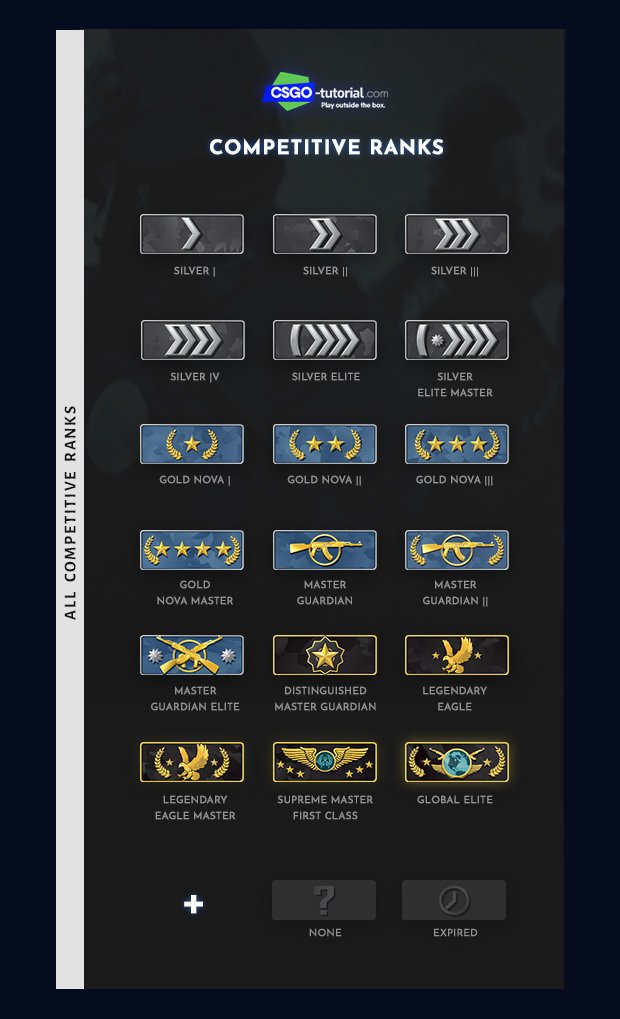79tka Insights
Your go-to source for the latest news and information.
Ranked Revealed: What Your CSGO Matchmaking Rank Says About You
Uncover the secrets behind your CSGO matchmaking rank and what it reveals about your skills, playstyle, and potential in the game!
Understanding Your CSGO Matchmaking Rank: What It Really Means
In the world of CSGO matchmaking rank, understanding how your rank is calculated can significantly impact your gameplay experience. Your rank is determined by a series of factors including your win-loss record, individual performance in matches, and the ranks of your opponents and teammates. The ranking system employs a hidden matchmaking rating (MMR) that adjusts with each match you play, creating a dynamic environment that aims to pit players of similar skill levels against one another. This ensures that your progression in the game reflects not just your winning streaks, but also your overall contributions to each match.
To truly comprehend what your CSGO matchmaking rank means, it’s essential to consider how rankings influence matchmaking. Players are segmented into various ranks such as Silver, Gold, and Master Guardian, with each rank indicating a different level of skill. For instance, if you're consistently playing at Silver 3, this suggests you have foundational skills but may need to improve on aspects like teamwork or game strategy to climb higher. Furthermore, understanding where you stand in relation to these ranks can help set realistic goals for your personal improvement and provide clarity on what areas you need to focus on for advancement.

Counter-Strike is a popular tactical first-person shooter game that emphasizes team play, strategy, and communication. One of the key maps used in competitive play is Nuke, which features complex layouts and requires players to master nuke callouts for effective teamwork.
The Psychology Behind CSGO Ranks: What Your Rank Says About You
The world of CSGO ranks is not just a measure of skill; it offers intriguing insights into a player's personality and mindset. Players often find themselves categorized into ranks such as Silver, Gold, or Master Guardian, with each rank representing not only their level of competence but also aspects of their psychology. For instance, those who find themselves in the lower ranks may exhibit traits such as a lack of confidence or a high level of anxiety during gameplay. This can lead to a cycle where their in-game performance is negatively impacted by their mental state, further solidifying their rank. In contrast, players who have achieved higher ranks often display characteristics associated with resilience, strategic thinking, and effective teamwork, indicating a more robust mental framework.
Interestingly, the social dynamics within CSGO ranks can also influence a player's behavior. Players in higher ranks may feel a sense of accountability not just for their own performance but also for their teammates, which fosters a sense of leadership. Conversely, those in lower ranks might struggle with feelings of frustration and blame, leading to a toxic gaming environment. It's essential to recognize that while CSGO ranks serve as a reflection of skill level, they are also a mirror to personal attributes such as patience, emotional regulation, and even social interactions. Understanding these psychological elements can enhance the gaming experience, enabling players to focus on personal growth and development instead of merely seeking rank progression.
How to Improve Your CSGO Matchmaking Rank and What It Reveals About Your Gameplay
Improving your CSGO Matchmaking Rank requires a blend of strategy, teamwork, and personal skill development. Start by focusing on the fundamentals of gameplay, such as crosshair placement and movement techniques. Regular practice in both deathmatch and aim training maps can sharpen your skills. Consider reviewing your past matches; tools like CSGO Stats provide valuable insights into your performance and areas for improvement. Additionally, communicating effectively with teammates during matches can significantly enhance your overall game strategy.
Your CSGO Matchmaking Rank doesn't just reflect your current skill level; it also reveals important patterns about your gameplay habits. For instance, a fluctuating rank may indicate inconsistency in performance, whether due to lack of focus or underestimating opponents. Engaging in regular ranked play and analyzing metrics such as win rates and kill/death ratios can provide a clearer picture of your growth. Furthermore, participating in a well-structured team can help maintain a higher rank while promoting cooperative play, which is vital in a team-based environment.